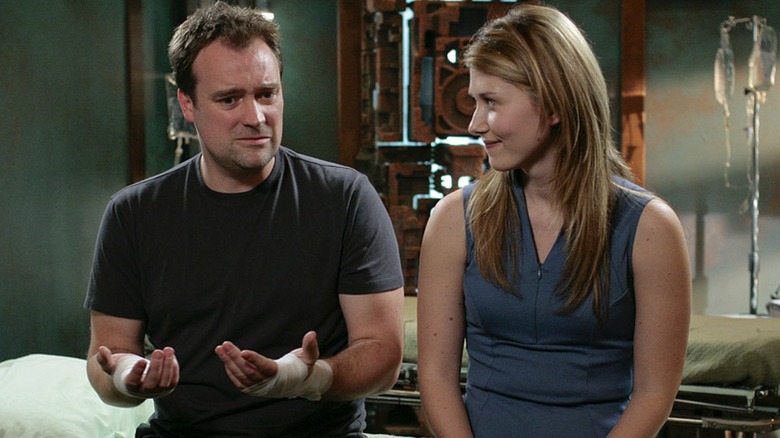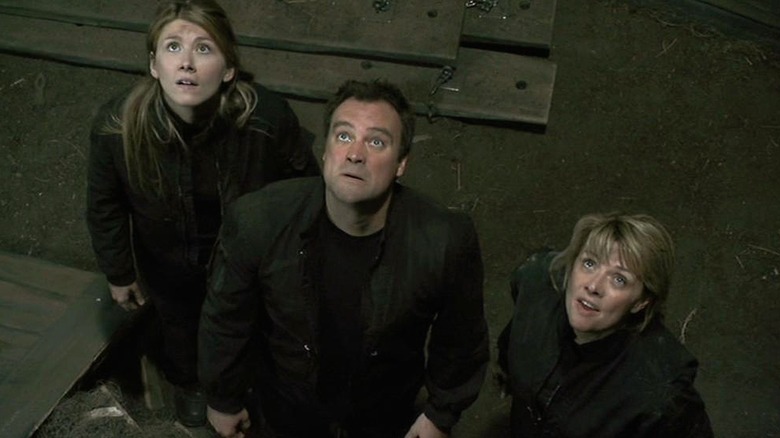The Stargate Atlantis Episode That Proved To Be A Production Nightmare For David Hewlett
This post contains spoilers for "Stargate Atlantis."
"Stargate Atlantis" could be a lot of fun throughout its five-season run, but even the best shows have episodes that don't add anything meaningful to their lore. "Atlantis," however, had perfected a formula that made most filler episodes effective, where a lot of care and consideration went into fleshing out the interpersonal dynamics among the Atlantis crew. Still, a dip in quality is to be expected from time to time in the form of one-off episodes that don't quite manage to hit the mark or fail to entertain, despite promising galactic hijinks. Season 4's "Trio" comes to mind, as this entry revolves around a situation that feels too juvenile for our super-smart team of space explorers, who inevitably act out of character to solve a ridiculous crisis.
Here's what happens. The earthquake-prone planet M5V-801 becomes the focal point for the Atlantis crew, especially for Dr. Jennifer Keller (Jewel Staite) and Dr. Rodney McKay (David Hewlett), who compile a comprehensive report. The good doctors discuss the planet's dire condition with the others, and they decide to plan a mission to evacuate settlements to a safer part of the planet, but the road ahead seems filled with obstacles. Samantha Carter (Amanda Tapping) decides that she, along with McKay and Keller, will go to M5V-801, but the trio falls through an unstable part of the ground after reaching the planet. They find themselves trapped in a room with no easy way out, and things escalate when tremors shake everything and threaten to topple them into a nearby chasm.
The problem with this premise is that the trio could've easily stabilized the room by removing the heavy boxes strewn around, allowing themselves to be stabilized even during the tremors. To see three intelligent characters ignore such an obvious solution saps the sequence of any suspense, and the fact that it is followed up with noticeable continuity errors doesn't help matters. What's worse, Hewlett told GateWorld in a 2008 interview that this sequence was a nightmare to shoot, as it wasn't fun to work inside a claustrophobic set that shook from time to time. Here's what the actor had to say.
Hewlett had a rough time dealing with a wonky, uncomfortable Stargate Atlantis set
Hewlett began his interview by sharing a positive experience about "The Last Man," the brilliant season 4 finale that allowed McKay to embrace a mindset distinct from anything explored in the show. Unfortunately, these feelings of gratitude didn't carry over to "Trio":
"'Trio' was absolute hell. I'm not afraid to say that. You were in a box that moved. With cranes and dust. And we were strangely miserable to the point of euphoria. Like we got to the point where it was ... I've got to admit, there are worse things in the world to happen to an actor than to be stuck in a dark box with Jewel Staite and Amanda Tapping. I don't think you get a lot of sympathy from people on that. And they were hilarious."
Per Hewlett, both Staite and Tapping were excellent company, but the logistics of the scene were so complicated that it tainted the experience for the worse. Hewlett compared the experience to "Cube," the 1997 Vincenzo Natali flick that the actor starred in, while stating how the sets were similar due to the claustrophobic setting (yet somehow, completely different):
"It was so tough and so technical — because there was so much stuff. You know, it's funny, because I did this film, 'Cube,' which was all based in these little boxes. And then, all of a sudden, here we are on a set which is basically the same thing. Only they had a bigger box, and it actually moved. We had to do all the shaking ourselves on the 'Cube' stuff. We couldn't afford hydraulics and things."
While "Trio" has its shortcomings, this episode allows Keller to prove her worth to the crew, as her actions help her shine and evolve beyond a secondary character existing solely for plot convenience. It's not a good "Atlantis" episode by any stretch of the imagination (especially if we measure it against the established standard), but it is one that awkwardly propels a key relationship in the series.

